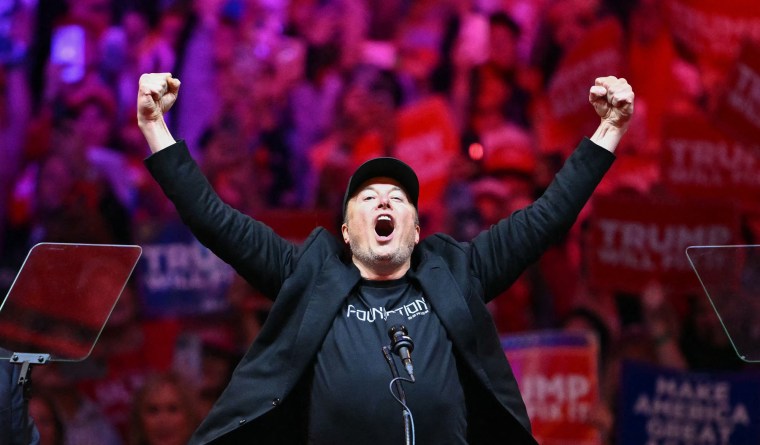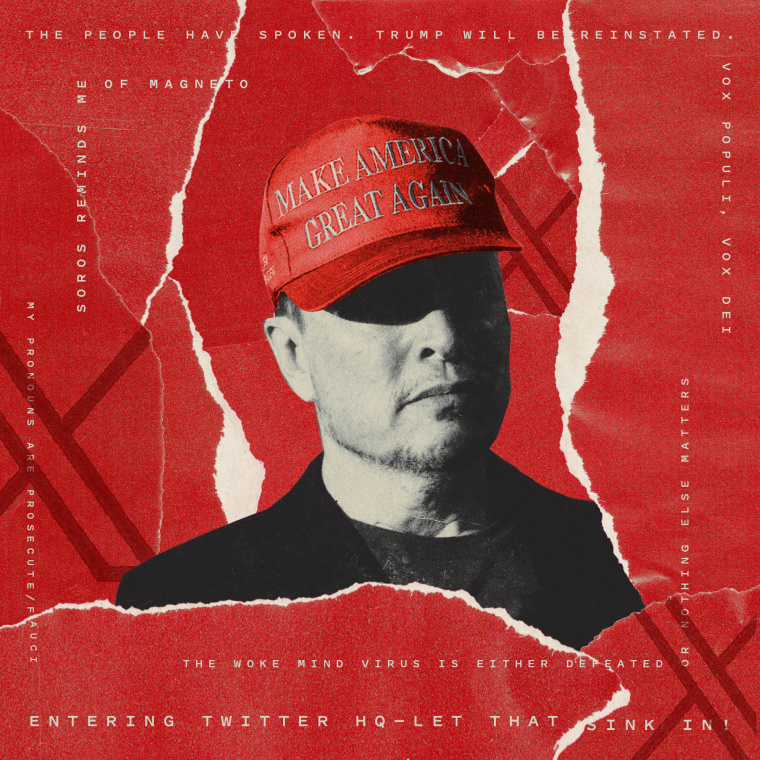In April 2022, days after Elon Musk offered to buy the app then known as Twitter, the tech billionaire pledged that under his stewardship the platform would not take sides in politics.
“For Twitter to deserve public trust, it must be politically neutral, which effectively means upsetting the far right and the far left equally,” Musk posted on the app, now renamed X.
It hasn’t worked out that way.
In the two years since then, Musk has transformed the platform, once regarded as the global town square, into an echo chamber amplifying right-leaning causes and in particular former President Donald Trump’s electoral campaign, according to academic research, public opinion surveys, data on X’s most influential users, engagement metrics and reports about X’s working directly with the Trump campaign.
And in recent months, Musk has become one of Trump’s biggest donors and most energetic supporters, turning X into an unofficial house organ for his campaign.
As the election approaches, X’s AI-powered trending section has promoted voter-fraud conspiracy theories and smears against Vice President Kamala Harris, NBC News reported Saturday.
On Tuesday, Musk promoted an X Community — a large group of users — called the Election Integrity Community, which was created by his super PAC, America PAC. The community, which is automatically added to a list of feeds users see when they log into the X when they join it, is full of users spreading conspiracy theories, misinformation, rumors and suspicions about voter fraud. Studies and investigations have found that there is no evidence of widespread voter fraud in the U.S.
All told, Musk’s structural changes to the app have tilted in favor of far-right users and posts, researchers say.
“We do have a lot of evidence to suspect that X is turning more and more far-right by the day,” said Giulio Corsi, a researcher at the University of Cambridge who studied X’s recommendation algorithm.
Musk and X did not respond to requests for comment.
Musk maintains that X is politically neutral.
“We’re very rigorous on the X platform about being a fair playing field, a level playing field, being fair to all sides,” he said this month at a town hall event in Pennsylvania hosted by America PAC which has repeatedly backed Trump in ads. “We want both sides to say their piece and to let there be a free debate.”
But Musk’s commitment to neutrality was thrown into doubt soon after he acquired Twitter in October 2022. Within 48 hours of the takeover, he tweeted and then deleted a false anti-LGBTQ conspiracy theory about Paul Pelosi, the husband of Rep. Nancy Pelosi, D-Calif., then the House speaker. Musk also laid off Twitter employees responsible for monitoring misinformation, and he gave far-right users new leeway to engage in homophobic and transphobic attacks. Musk also suspended several high-profile journalists.
Weeks into Musk’s tenure, the app reportedly restored over 62,000 accounts previously suspended for policy violations in an action that Musk called “general amnesty.” Some of them were white nationalist and neo-Nazi accounts or accounts that repeatedly boost conspiracy theories.
Meanwhile, some progressives and liberals have quit Twitter for other platforms, such as Threads or Bluesky, shifting X’s user base further right.
By May 2023, Musk was reshaping Twitter into a Republican media hub. He hosted Florida Gov. Ron DeSantis’ GOP primary bid announcement and reversed a ban on political advertising, clearing the way for campaign ads, including ads from Robert F. Kennedy Jr., an independent who now supports Trump. (Some Democrats also advertise.)
Behind the scenes, Musk made further changes that weakened traditional news media’s influence on the platform while benefiting conservative pundits. He restructured X’s blue check mark verification program that previously signaled that an account was noteworthy, offering the checks to anyone who subscribed to his paid service. He also started sharing revenue with accounts that drove engagement and boosted the engagement of premium members in replies, creating incentives for endless arguing.
Last year, the app quietly removed policy language that protected transgender users from harassment — a move that LGBTQ advocates said invited misgendering, a form of bullying. Musk said misgendering should be allowed because it’s “at most rude and certainly breaks no laws.”
And Musk, with the largest account on the platform, has played a personal role in helping make several conservative causes go viral, on subjects from diversity in airlines to an allegedly impending civil war to false accusations that immigrants from Haiti are attacking cats and dogs.
The shifts have remade X’s user base, consolidating a right-wing elite who drive political debate on the app — similar to conservative talk radio hosts who appeared a generation ago. University of Washington researchers dubbed the accounts “newsbrokers” in a report this month, noting they often lack journalistic standards and propagate conspiracy theories and partisan views. Musk has personally boosted many of them, such as @libsoftiktok and the account of conspiracy theorist Laura Loomer, who was suspended from Twitter before Musk bought it.
And the accounts have muscle. UW researchers found that, in the three days after the July 13 assassination attempt on Trump, nine right-wing “newsbroker” accounts accumulated 1.2 million reposts, while nine traditional news outlets gathered 98,064 reposts — or one-twelfth the engagement — even though the news outlets have larger followings and adhere to journalistic standards based in factual reporting.
“The information environment on X is becoming more and more oligarchical when it comes to a few accounts controlling the supply of news,” said Mert Bayar, a postdoctoral researcher at the UW Center for an Informed Public.
And when the news involves Trump, he said, a handful of right-leaning accounts tend to dominate.
“X is becoming more and more right-wing as a platform,” he said. “X is becoming — and consolidating — the voices of the right wing. Some of them were banned before. They are back.”
Other research has shown conservative content getting a boost. Corsi, of the University of Cambridge, found that “high toxicity tweets and those with right-leaning bias see heightened amplification” on X in a study examining posts about Covid-19 and climate change published in March in the journal EPJ Data Science.
“A lot of the far right returned to Twitter because all of a sudden it looked like a safe space for the far right,” Corsi said.
Musk is the CEO of Tesla and SpaceX, but X may be his highest-profile political asset. It is one of a variety of vehicles through which he is trying to influence the presidential race, alongside personal appearances in swing state Pennsylvania and more than $118 million he has given to his pro-Trump super PAC for voter turnout.

Gita Johar, a business professor at Columbia Business School, found in her research of X that there was a clear change in engagement on the app after Musk bought it: Engagement rose for right-wing media, stayed level for left-wing media and fell for fact-checking media.
“The people who are on X after Musk are different from the people before Musk,” she said. “People left, and perhaps new people joined, and the people who remain reflect the DNA of the platform.”
There is one allegation of explicit coordination between X and the Trump campaign. This month, The New York Times reported that, after independent reporter Ken Klippenstein published hacked Trump campaign information related to Republican vice presidential nominee JD Vance, the campaign connected with X to halt the spread of the materials. The newspaper cited two anonymous sources, and NBC News has not independently confirmed the reporting. X, though, blocked links to the hacked material and suspended Klippenstein’s account.
The Trump-Vance campaign did not respond to requests for comment on the report.
Musk had earlier criticized Twitter’s previous management for what he alleged was similar handling of a story in 2020 by the New York Post about President Joe Biden’s son Hunter. Twitter executives have defended their actions in 2020 as an attempt to avoid giving incentives for cyberattacks on a presidential campaign, though ex-CEO Jack Dorsey has said that, in hindsight, the company erred.
Documenting X’s rightward shift is now more difficult after Twitter last year increased the cost of its data stream beyond what most academic researchers could afford. But some researchers said in interviews there is ample evidence to show the direction X has been headed in.
The Washington Post reported Tuesday that the changes at X have affected the White House’s official account, which now gets about half the views per post that it got a year ago. The Post, which analyzed the top 50 Democratic and 50 Republican congressional accounts, also found that congressional Republicans are far more likely to have viral posts than congressional Democrats — by a ratio of about 5-to-1 this year.
Musk hosted Trump for a two-hour live conversation and livestreamed rallies from Pennsylvania where Musk has stumped for Trump, all while Musk has posted a steady stream of debunked conspiracy theories about voting and the election to his 202 million followers.
“Whatever he tweets, whatever he retweets, whatever he replies to gets millions of views automatically,” said Bayar of the University of Washington.
At a town hall event in Pennsylvania on Oct. 18, Musk defended X by saying that “there’s not a single account on the left that’s been suppressed: not one, no suspensions, nothing.”
But X has suspended several left-leaning accounts. They include the “White Dudes for Harris” account in July, the “Progressives for Harris” account in August and the account of Rep. Dean Phillips, D-Minn., last year. Those accounts said they did not receive reasons for their suspensions, and they were later reinstated. Some X users also said in July that they were blocked from following @KamalaHQ, the Harris campaign’s main account.

A Pew Research Center survey from March found that rather than upsetting the far right and the far left equally, X generated perceptions that were polarized along party lines: 53% of Republicans said X is mostly good for democracy, while 26% of Democrats said the same. Three years ago, the numbers were flipped: 17% of Republicans said Twitter was mostly good for democracy, against 47% of Democrats.
“We’re seeing deep partisan divides in user views of how this platform affects American democracy,” said Colleen McClain, a senior researcher at the Pew Research Center.
Democrats also say they are under attack on X: 48% of Democratic users told Pew that getting harassed on X is a major problem, while 15% of Republican users said the same.
An NBC News poll found that support for Musk among Democrats had withered to 6%, while 62% of Republicans said they had positive feelings about him.
Johar, of Columbia University, said Musk’s endorsement of Trump is enough to sow doubt about X’s evenhandedness, as executives at rivals such as Facebook, Instagram, YouTube, Reddit and TikTok have stayed largely silent on the election.
“The minute an owner signals where he stands, that signals that it’s not going to be a neutral platform,” she said.
As the election draws closer, Musk has ramped up his pro-Trump efforts on X with dozens of political posts a day. He used X to promote a $47 offer to people who referred registered swing-state voters to sign a petition, a move that seemingly offered incentives for conservative-leaning voter registration in swing states. He later increased the offer to $100 and added a daily $1 million lottery-style giveaway — now the subject of a lawsuit brought by Philadelphia District Attorney Larry Krasner. (The lawsuit is against Musk and his super PAC, not X, and Musk has defended the giveaway as lawful.)
And in the past several days, Musk and his super PAC have grown more vulgar and violent in their language about Harris. Musk posted a video in which a gladiator with Trump’s face sword-fights with a warrior with Harris’ face, and the super PAC posted a separate video, later deleted, that called Harris the “C-word” — a double entendre referring both to “communist” and to a vulgar word.
